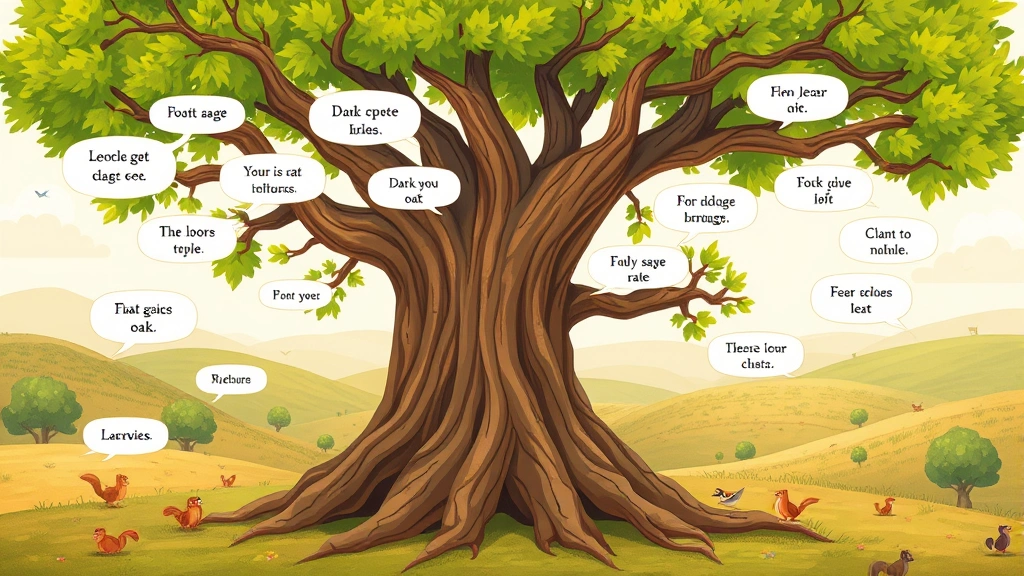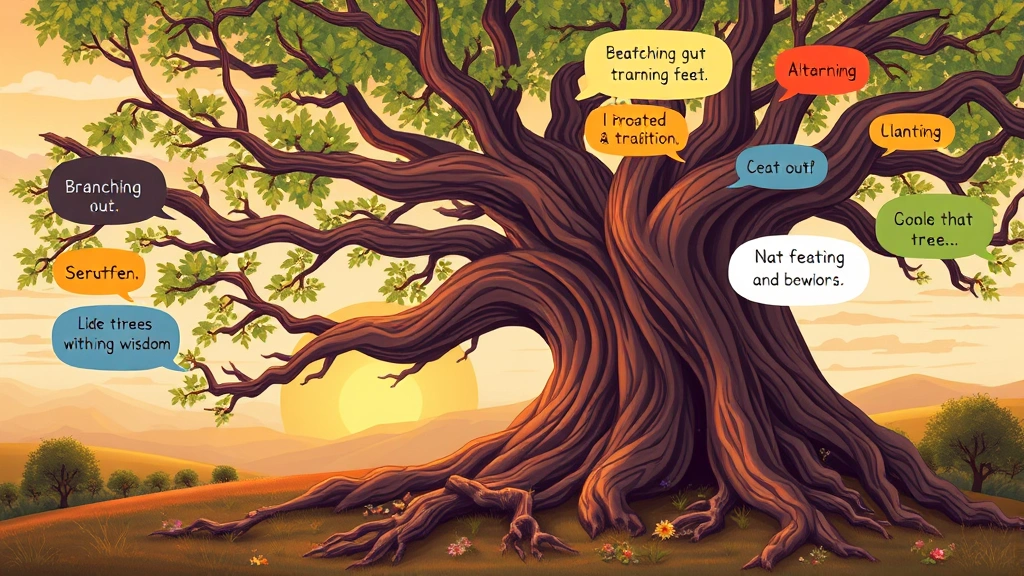Have you ever stopped to think about how much we talk about nature, even when we're not actually in nature? It's truly fascinating how often the natural world, especially trees, branches, and roots, pops up in our everyday language. From the mighty oak to the delicate sapling, trees have been a source of wisdom, strength, and life for centuries, and this deep connection is beautifully reflected in our idioms. Get ready to embark on a delightful linguistic journey as we explore 35 idioms that celebrate the enduring presence of trees in our conversations. You'll be surprised at how many you already use without even thinking about it!
35 Idioms That Grow on You
Let's dig in and discover these leafy gems! You'll find that each idiom paints a vivid picture, often with a subtle hint of wisdom.
- Bark up the wrong tree: Oh dear, this one means you're pursuing a mistaken course of action or accusing the wrong person. It's like your dog barking at an empty tree while the squirrel is happily munching nuts on another!
- Can't see the forest for the trees: Ever get so caught up in the tiny details that you miss the big picture? That's exactly what this idiom describes.
- Root and branch: This means completely, thoroughly, or from top to bottom. Think about how a tree's roots and branches are its entire being!
- Out on a limb: When you're in a risky or vulnerable position, you're out on a limb. Imagine climbing a tree and venturing onto a thin branch – a bit precarious, right?
- Money doesn't grow on trees: A classic! This is what your parents might have told you when you asked for something expensive. It means money is not easily acquired and shouldn't be wasted.
- The apple doesn't fall far from the tree: This idiom suggests that children usually resemble their parents in character or behavior. Like a fallen apple, they're close to their origin.
- Hold a branch out: To offer a truce or seek reconciliation. It's a peaceful gesture, much like extending an olive branch.
- Shake the family tree: To investigate one's ancestry or family history, often playfully implying that some surprising characters might emerge!
- Build a tree house: While literally building one, idiomatically it can mean creating a personal, secret, or safe haven.
- Knock on wood (or touch wood): This is a superstitious phrase said to ward off bad luck, often accompanied by touching a wooden surface.
- Wood for the trees: Similar to 'can't see the forest for the trees,' but often used to imply someone is too focused on specifics to grasp the overall situation.
- The tree of knowledge: This refers to the pursuit of wisdom or understanding, often with the implication of gaining forbidden or profound insights.
- Branching out: To expand into new areas or activities. Think of a tree's branches spreading wide!
- As strong as an oak: Used to describe someone or something incredibly robust and resilient. Oaks are known for their strength and longevity.
- To bear fruit: When your efforts finally produce positive results, they 'bear fruit.' Just like a tree producing apples or oranges!
- To take root: This means to become established or firmly fixed in a place or idea.
- Sapling (used metaphorically): A young person, often with potential, much like a young tree.
- Forest of hands: When many people raise their hands to volunteer or answer a question, it looks like a dense forest.
- Wood and nails: Something very basic or fundamental, often referring to construction.
- Up a tree: To be in a difficult or awkward situation, stuck and unable to move forward.
- Root-bound: Feeling constrained or unable to grow due to limitations, much like a plant whose roots have filled its pot.
- Branch of a company: A local office or division of a larger organization.
- The family tree: A diagram showing the relationships between members of a family, often extending through many generations.
- To be out of the woods: To be past a difficult or dangerous situation. You're no longer lost in the metaphorical forest!
- To grow like a weed: To grow very quickly and vigorously, often unexpectedly.
- To be rooted to the spot: To be unable to move, often due to surprise, fear, or shock.
- The root of the problem: The fundamental or ultimate cause of an issue.
- To turn over a new leaf: To make a fresh start or change one's behavior for the better. Like a tree in spring!
- To hit the wood: To crash or collide, often with a tree or wooden object.
- To have deep roots: To have strong, long-standing connections or origins.
- To be unable to see the wood for the trees: This is a slight variation of the earlier idiom, emphasizing an inability to grasp the general situation due to excessive focus on details.
- To feel tree-mendous: A playful pun on "tremendous," implying feeling great, perhaps after spending time in nature!
- A forest of ideas: A large number of creative thoughts or concepts.
- To get to the root of something: To discover the underlying cause or origin of a situation.
- To be evergreen: To remain fresh, popular, or relevant over a long period, much like an evergreen tree that retains its leaves year-round.
Key Takeaways
Isn't it fascinating how deeply ingrained the imagery of trees is in our language? From illustrating simple concepts like growth and connection to complex ideas like obstacles and origins, these idioms offer a vibrant snapshot of human experience. You've seen how they paint pictures, convey emotions, and often carry nuggets of wisdom passed down through generations. Using these idioms can make your conversations more colorful and your writing more engaging, adding a touch of natural flair!
Frequently Asked Questions (FAQ)

What is an idiom?
An idiom is a phrase or expression whose meaning cannot be understood from the ordinary meanings of its individual words. It's a figurative saying that often has a cultural or historical context. Think of "raining cats and dogs"—it doesn't literally mean animals are falling from the sky!
Why are there so many idioms related to trees?
Trees have been central to human life and civilization for millennia. They provide shelter, food, building materials, and have often been seen as symbols of wisdom, strength, and life itself. This deep, historical connection naturally led to their frequent appearance in our language and common expressions.
How can I learn more idioms?
The best way to learn idioms is to read widely (books, articles, even comics!), listen actively to conversations, and pay attention to how native speakers use language. You can also use idiom dictionaries or online resources. Don't be afraid to try using them in your own conversations—practice makes perfect!
Are these idioms used globally?
While many of these idioms are widely recognized and used in English-speaking countries around the world, some might be more common in certain regions than others. However, their universal themes often make them understandable even if not explicitly used in a particular local dialect.
Can using idioms improve my English fluency?
Absolutely! Incorporating idioms into your vocabulary can make your English sound more natural and sophisticated. It shows a deeper understanding of the language and its nuances, helping you communicate more effectively and connect with native speakers. It's like adding a sprinkle of magic to your words!








